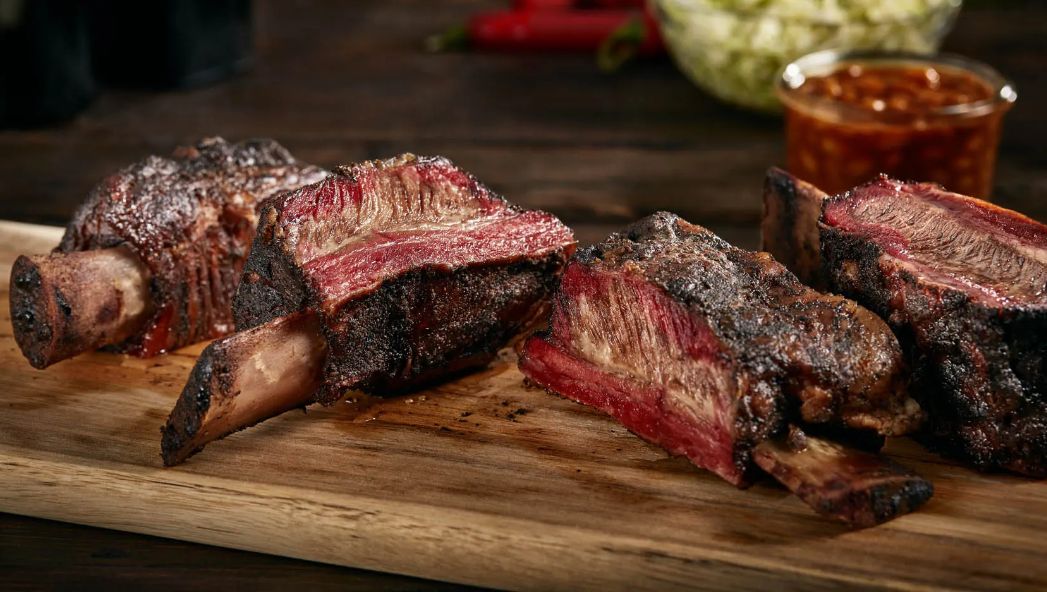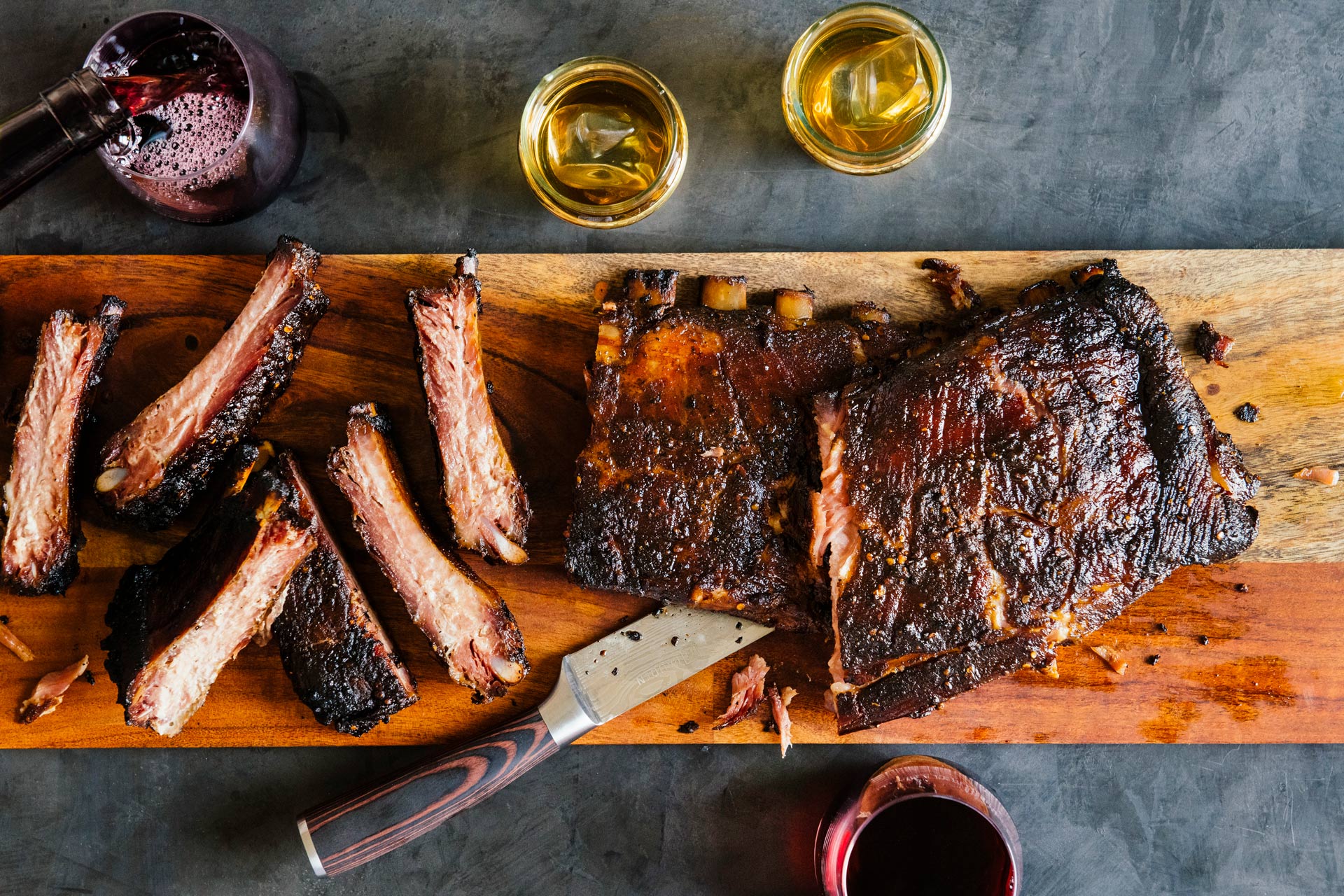Few foods evoke a sense of comfort and contentment quite like ribs. Whether you prefer short ribs or spare ribs, the taste is simply unbeatable!
In this blog post, we’ll be taking a look at short ribs vs spare ribs in all their juicy glory. We’ll explore how they are different cuts of meat, how each one should be cooked (and why!), and which type provides more flavor overall when cooked properly.
So grab your forks because it’s time to get down to business and find out who will break away with the rib crown!
What Is Short Ribs?

Short ribs are cut from the rib section of the cow. As their name implies, they are shorter than other ribs and have more fat content which makes them particularly juicy and flavorful when cooked. Generally, short ribs are about four inches in length and one to two inches wide.
The most common way to prepare short ribs is by slow-cooking them in a liquid like broth or wine over low heat for several hours. This method breaks down the collagen in the meat, resulting in tender, melt in your mouth deliciousness! You can also braise or barbecue short ribs if you’re feeling adventurous.
Short Ribs Nutrition Fact
Short ribs are a good source of protein, but they also have higher amounts of fat and calories than other cuts of beef. A 3-ounce serving of short ribs contains approximately 250 calories and 18 grams of fat. However, the fat is mainly unsaturated, so it’s relatively healthy if consumed in moderation. The same 3-ounce serving also provides 35% of the daily recommended value for iron and 10% percent of your daily intake for zinc!
What Is Spare Ribs?

Spareribs come from the same area of the cow as short ribs, but they’re a different cut entirely. Unlike their shorter counterparts, spareribs are longer and have more bone and fat layers. This makes them well-suited for grilling or smoking over indirect heat for great flavor.
In terms of taste, spareribs have a stronger smoky flavor than short ribs due to their higher fat content. Many chefs believe that when cooked properly (low and slow), spareribs are even juicier than short ribs.
Spare Ribs Nutrition Fact
Like short ribs, spareribs are higher in fat and calories than other cuts of beef. A 3-ounce serving contains approximately 270 calories and 18 grams of fat. However, the majority of this fat is unsaturated, making it a relatively healthy choice when consumed in moderation. In addition to protein and fat, spareribs contain significant amounts of iron (40% of your daily value) and zinc (14% of your daily intake).
What Is The Difference Between Short Ribs vs Spare Ribs?
The main difference between short ribs and spareribs is the cut of meat. Short ribs are shorter and have more fat, while spareribs are longer with more bones and layers of fat.
The cooking methods for each also vary: short ribs should be slow-cooked in liquid over low heat, while spareribs are better suited for grilling or smoking over indirect heat.
In terms of taste, both provide a juicy flavor but with subtle differences. Short ribs tend to be slightly sweeter due to their higher fat content, while spareribs offer a stronger smoky flavor that comes from the bone marrow.
When it comes down to nutrition, there isn’t much difference between the two cuts of meat. Both have roughly the same amount of calories and fat, but spareribs contain slightly more iron and zinc.
Read more:
Similarities of Short Ribs vs Spare Ribs
Though there are differences between short ribs and spareribs, both cuts of meat have several similarities.
The most obvious similarity is their origin: they both come from the rib section of the cow. They also provide similar amounts of protein and fat, with a 3-ounce serving containing approximately 250 calories and 18 grams of fat. The majority of this fat is unsaturated, making it relatively healthy when consumed in moderation.
Finally, both short ribs and spareribs offer great taste when cooked properly! Slow-cooking short ribs results in tenderness that melts in your mouth, while grilling or smoking spareribs will bring out a smoky flavor that can’t be beat.
Which Is Better? Short Ribs vs Spare Ribs
When it comes down to choosing between short ribs or spare ribs, it really depends on what you’re looking for in terms of taste and texture. Both types have their own unique flavors that can be enhanced with proper cooking.
Short ribs are perfect for slow cooking and braising, while spareribs work best when grilled or smoked. Both options can be incredibly delicious when cooked the right way, so it ultimately comes down to personal preference.
Making The Final Decision: Short Ribs vs Spare Ribs
Ultimately, short ribs and spare ribs both offer their own unique flavors that make them great choices for any meal. If you’re looking for a tender cut of meat with lots of flavor, short ribs are definitely the way to go. However, if you prefer your meat with a smokier taste and more fat content, then spareribs will do the trick!
No matter which one you choose, you can’t go wrong with either option. Just remember to cook them low and slow for the best results, and you’ll be in for a treat! Now all that’s left to do is pick up your fork and dig into some deliciousness!
How To Choose Short Ribs vs Spare Ribs?
When it comes to choosing between short ribs and spareribs, there are several factors to consider.
The first factor is the cut of meat: Short ribs come from the rib section of the cow, while spareribs are longer with more bones and layers of fat.
You’ll also want to take into account the cooking methods for each type. Short ribs should be cooked slowly in liquid, while spareribs are better suited for grilling or smoking over indirect heat.
Finally, consider your personal preference when it comes to taste. Do you prefer a sweeter flavor from higher fat content? Or do you enjoy a smokier taste that comes from bone marrow?
No matter which type of rib you choose, there are sure to be plenty of delicious flavors to enjoy. Just make sure to cook them properly and you’ll be in for a treat! So go ahead and pick up your fork it’s time to dig into some lip smacking goodness!
Short Ribs vs Spare Ribs: Cooking Tips & Suggestions
No matter which type of rib you choose, proper cooking techniques are key to achieving the best flavor.
When it comes to short ribs, slow cooking them in liquid is essential for maximum tenderness and flavor. You can braise them in a Dutch oven or bake them in a foil pouch with broth for optimal results.
For spareribs, grilling or smoking is the way to go. When using a grill, make sure you cook the ribs over indirect heat so they don’t burn on the outside before they’re cooked through. If you’re smoking your spareribs, low and slow is definitely the way to go this will ensure that your meat comes out juicy and full of flavor!
How to Store Short Ribs vs Spare Ribs
When it comes to storage, both short ribs and spareribs will keep for about three days when stored properly in the refrigerator.
Short ribs should be wrapped tightly in plastic wrap or foil before transferring them to an airtight container. Spareribs should also be tightly wrapped but can stay in their packaging if it seals securely.
It’s important to note that any leftovers must be cooled promptly and eaten within a day or two of cooking. You can also freeze either type of rib, just make sure you store them in an airtight container or bag and consume them within 4-6 months.
Knowing how to properly store short ribs vs spareribs is key for keeping your food safe, as well as preserving its flavor and texture. Now that you know the basics, it’s time to fire up the grill (or Dutch oven!) and enjoy some delicious ribs!
Short Ribs Recipes: What To Try
If you’re looking for some tasty recipes to try with your short ribs, here are a few ideas:
-Braised Short Ribs with Roasted Carrots and Shallots
-Red Wine Braised Short Ribs
-Sticky Honey Soy Glazed Short Ribs
-Barbecue Beer Braised Short Ribs
-Mexican Coffee Rubbed Short Rib Tacos
-Instant Pot Korean Style Beef Short Ribs
Sparerib Recipes: What To Try
For the best results when cooking spareribs, low and slow is the way to go. Here are a few of our favorite recipes that will have your mouth watering in no time:
-Slow Cooker Barbecue Ribs
-Grilled Spareribs with Whiskey BBQ Sauce
-Smoked Spareribs with Apple Cider Glaze
-Oven Baked Asian Sticky Ribs
-Korean Gochujang Baby Back Ribs
-Beer Braised Smoky Pork Spareribs.
FAQs: Short Ribs vs Spare Ribs
Q: What is the difference between short ribs and spareribs?
A: Short ribs come from the rib section of the cow while spareribs are longer with more bones and fat. The cooking methods for each type also differ, with short ribs best cooked slowly in liquid and spareribs better suited for grilling or smoking.
Q: How long will short ribs and spareribs last in the refrigerator?
A: Both types of rib should be stored properly in an airtight container or sealed package, then consumed within 3 days. Leftovers should be cooled promptly and eaten within a day or two. You can also freeze either type of rib as long as they are stored in an airtight container.
Q: What type of recipes should I use with short ribs and spareribs?
A: For short ribs, braising or baking are the best methods for achieving maximum flavor and tenderness. When using spareribs, grilling or smoking is ideal for getting a juicy and flavorful result. There are plenty of delicious recipes to try depending on your preference!
Q: Are short ribs the same as spare ribs?
A: No, short ribs and spareribs are not the same. Short ribs come from the rib section of the cow while spareribs are longer with more bones and fat. The cooking methods for each type also differ, with short ribs best cooked slowly in liquid and spareribs better suited for grilling or smoking. Additionally, when it comes to storage, both types of rib should be stored properly in an airtight container or sealed package before consuming within 3 days. Leftovers should be cooled promptly and eaten within a day or two. You can also freeze either type of rib as long as they are stored in an airtight container. With these tips in mind, you’re ready to start enjoying delicious short ribs and spareribs!
Q: Can I substitute short ribs for spare ribs?
A: No, it is not recommended to substitute short ribs for spareribs. Short ribs come from the rib section of the cow while spareribs are longer with more bones and fat. The cooking methods for each type also differ, with short ribs best cooked slowly in liquid and spareribs better suited for grilling or smoking. Furthermore, when it comes to storage, both types of rib should be stored properly in an airtight container or sealed package before consuming within 3 days. Leftovers should be cooled promptly and eaten within a day or two. You can also freeze either type of rib as long as they are stored in an airtight container. With these tips in mind, you’re ready to start enjoying delicious short ribs and spareribs!
Q: What are some of the best short rib and spare rib recipes?
A: For short ribs, braising or baking are the best methods for achieving maximum flavor and tenderness. Some great recipes include Braised Short Ribs with Roasted Carrots and Shallots, Red Wine Braised Short Ribs, Sticky Honey Soy Glazed Short Ribs, Barbecue Beer Braised Short Ribs, Mexican Coffee Rubbed Short Rib Tacos, and Instant Pot Korean Style Beef Short Ribs. When using spareribs, grilling or smoking is ideal for getting a juicy and flavorful result. Some excellent recipes include Slow Cooker Barbecue Ribs, Grilled Spareribs with Whiskey-Honey Glaze, Beer Braised Smoky Pork Spareribs, and Chinese Five Spice Baked Baby Back Ribs.
Q: Short Ribs vs Spare Ribs – Which is Healthier?
A: The healthiest option depends on how you prepare the ribs. Generally speaking, short ribs tend to be higher in fat than spareribs due to their location on the cow; however, when cooked properly with a flavorful marinade or rub and served with nutritious sides like vegetables and salads, short ribs can make for a delicious and balanced meal. As far as spareribs go, grilling or smoking them over indirect heat helps to keep the fat content low while still creating a juicy end result.
Conclusion
Short ribs and spare ribs are two types of cuts from the rib section of a cow. Both are flavorful, but they differ in terms of texture and appearance. Short ribs are more tender than spare ribs, while spare ribs have more fat. Ultimately, it comes down to personal preference when deciding which type of rib to buy. Do you prefer short or spareribs? Let us know in the comments below!
Read more:
Beef Tenderloin vs Filet Mignon

James Burney is the founder of Acadia House Provisions is a restaurant that with local & upscale dishes and high-quality kitchen supplies and food products. James was born and raised in Maine, and he has always been passionate about cooking. After working in a number of prestigious restaurants he started Acadiahouseprovisions.com with the goal develop into a comprehensive information site specializing in cooking and cuisine. His goal is to make it easy for people to cook delicious meals at home without spending a fortune.
